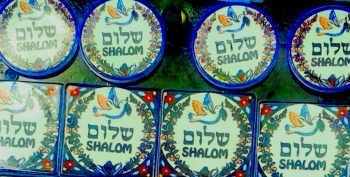
Photo by Ayana
Every conversation starts with them, every conversation ends with them: greetings. They’re at the heart of every language, of every human contact. Knowing the Hebrew greetings provides you control over the interaction.
הַי (means and sounds like the English “hi”) is the informal way to say hello. It’s short, it’s international and it’s very common. Israelis use it at every occasion: when meeting family and friends, or even when talking to clerks and other service givers.
שָׁלוֹם (Sha-lom) is the formal way to say the same thing. You can use it at every occasion as well – with relatives and with strangers. Israelis are very warm and friendly people, even when they use the formal way to greet someone it sounds casual. So feel free to use שָׁלוֹם to greet people in Israel without feeling too polite or solemn.
When someone greets you with שָׁלוֹם or הַי you can answer with the same word. וּבְרָכָה (Uv-ra-cha) is another less common option, though only in response to שָׁלוֹם. It originates from the literary phrase שָׁלוֹם וּבְרָכָה (literally means: may peace and blessing be with you), but this phrase is not in common use.
Israelis also use the Arabic greeting אהלן (A-ha-lan) freely. Arabic has a lot of greetings words, and even אהלן can be merged into phrases, but we, the Israelis, use it by itself. With a Hebrew accent of course.
When answering the phone we say הָלוֹ (Ha-low). It’s a twisted pronunciation of “hello” but it’s assimilated so well in the Hebrew language, it’s already sounds like a real Hebrew word.
סְלִיחָה (Se-li-ha) has multiple meanings: pardon, I’m sorry, and excuse me. To appeal to someone politely, or to get someone attention, we used סְלִיחָה. When you roam the streets of Israel you will likely hear this word over and over. Whenever we want to ask, inform, or mention something to some stranger we use it.
Above are just six tiny words but their usefulness is tremendous!





